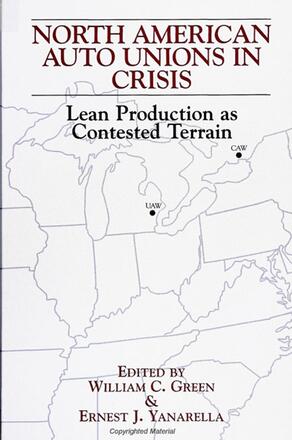
North American Auto Unions in Crisis
Lean Production as Contested Terrain
Alternative formats available from:
This edited volume provides the first comparative cross-national study of U.S. and Canadian Labor relations in Japanese North American auto transplants, Japanese joint ventures with the Big Three automakers, and Saturn, the Japanese-style GM auto plant.
Description
In this edited volume, U. S. and Canadian political scientists, sociologists, and labor educators contribute to the debate of the crisis of the Fordist regime of mass production and its implications for organized labor. They present the first comparative cross-national study of the labor relations in Japanese North American automobile transplants, Japanese joint ventures with the Big Three automakers, and Japanese-style General Motors auto plants. They specifically focus on the challenges the Japanese lean production model has posed to North American auto labor's organizing, collective bargaining, and shop floor representation experiences and how the United Auto Workers and the Canadian Auto Workers have responded to these challenges. The authors point to the pressing need for the North American labor movement, whose legal rights are rooted in a mass production regime, to rethink its interests and goals if it is to successfully confront the formidable obstacles presented by a changing international and hemispheric political economy increasingly dominated by Japanese lean production practices.
William C. Green is Professor of Government at Morehead State University. He is coeditor (with Ernest J. Yanarella) of The Unfulfilled Promise of Synthetic Fuels: Technological Failure, Policy Immobilism, or Commercial Illusion and The Politics of Industrial Recruitment: Japanese Automobile Investment and Economic Development in the American States. Ernest J. Yanarella is Professor of Political Science and Director of Graduate Studies at the University of Kentucky. He is author of The Missile Defense Controversy: Strategy, Technology, and Politics, 1955-1972; co-author (with Ann-Marie Yanarella) of Energy and the Social Sciences: A Bibliographical Guide to the Literature; and co-editor (with Randal H. Ihara) of The Acid Rain Debate: Scientific, Economic, and Political Dimensions; and (with Lee Sigelman) of Political Mythology and Popular Fiction.
Reviews
"I like the sustained and well-documented critique of the pro-management perspective of advocates of 'lean production' and Japanese management; the use of solid evidence such as worker surveys and participant observation; the theoretical unity around the ideas of Gramsci on cultural hegemony and the contradictions of mature capitalism; and the comparison with Canadian unions and politics. " -- Susan B. Hansen, University of Pittsburgh